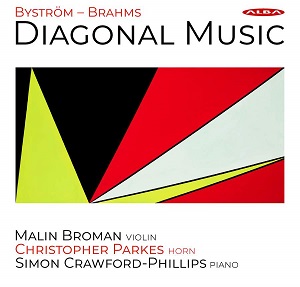
Diagonal Music
Britta Byström (1977-)
Diagonal musik (2017)
A Walk to Brahms (2019)
Johannes Brahms (1833-1897)
Trio in E-flat major, Op 40 (1865)
Zwei Gesänge, Op 91 (1884 & 1863/64)
Malin Broman (violin), Christopher Parkes (horn), Simon Crawford Phillips (piano)
rec. 2019, Berwaldhallen, Stockholm
Alba ABCD513 [63]
The opening work of this disc, Diagonal Musik by Britta Byström, gives it its title. It consists of twelve short pieces, each of approximately 2 minutes duration, for violin, horn and prepared piano. For those whose initial response to contemporary music is often, at best, passive-aggressive, please allow the hackles to subside. These are fascinating miniatures exploring, in a most creative and engaging way, the almost limitless tonal combinations that the three instruments can afford. The booklet notes place all four pieces on this disc into their proper historical and artistic context, but it would have been desirable to have some information on what the ‘preparation’ of the piano involved. The listener is vaguely aware that something has been done to alter the usual piano sound, but it is impossible to deduce what that might have been. John Cage’s exercises in similar sound manipulation are often obvious in terms of the changed timbres, but here the listener is left guessing.
This is a minor complaint in what is a most enjoyable and beautifully executed project. The first piece is followed by A Walk to Brahms, where the composer of Diagonal Musik creates a persuasive musical bridge between her own work and that of Johannes Brahms. The Trio in E-flat, Op 40 is regarded as one of the composer’s greatest chamber works in a somewhat crowded field. It also has several personal aspects which place it in a somewhat different category from the composer’s other contributions to the genre. Written shortly after the death of his mother, Brahms uses a German folk melody in the finale and in the slow movement seems to hark back to his childhood when he had himself learnt to play the natural horn. The work has a long and distinguished recording history, with players such as Dennis Brain, his father Aubrey Brain and countless others displaying both their skill and sensitivity in a work which is notable for its wide-ranging expressive and emotional demands on the performers. At almost half an hour’s duration, this is a work on a large scale and forms the centrepiece of this very satisfying chamber recital. Suffice it to say, that the performance lacks nothing in either emotional intensity in the slow movement or excitement in the joyous Scherzo and final Allegro con brio. The disc concludes with a restful epilogue in the form of transcriptions of two songs Op 91, originally for viola, voice and piano.
The presentation of new music with old can be a gamble unless there is considerable common ground between the pieces, as here. It is good to be able to welcome wholeheartedly such a project which is also played with such evident affection for the music, both contemporary and classical. I hope this group will be encouraged to provide a second volume which adopts the same concept.
Martyn Strachan
Help us financially by purchasing from




















